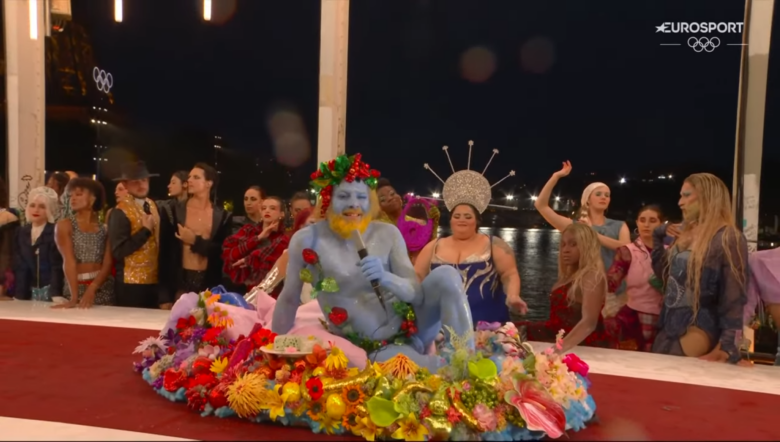A commentary by Hanna Stepanik
On Sunday, August 11 2024, the 2024 Olympic Games in Paris came to an end. As we noted in a commentary in the run-up to the opening, we tried to focus on human rights issues and sustainability aspects during the Games.
In view of the fact that the Paralympic Summer Games in Paris start today – on Wednesday, 28 August – we would like to summarize our high- and lowlights of the 2024 Olympics for you.
Highlights
Let’s start with the bombastic opening ceremony. This was sharply criticized by the Catholic Church in France and Catholic organizations worldwide, as well as by right-wing politicians, far-right groups and queerphobes in general. They strongly condemned the depiction of drag queens during a performance that was supposedly based on Leonardo da Vinci’s painting “The Last Supper”. Those responsible apologized and made it clear that the performance was intended to be a “message of love” and not a parody.
The French authorities banned female* athletes competing for France from wearing the hijab, the Muslim headscarf, during the Games (read more on this in our lowlights below). However, following reactions from athletes and social media users, they were allowed to cover their hair with a cap. Dutch long-distance runner Sifan Hassan was praised after she wore a hijab while accepting the gold medal for her record-breaking marathon, sending a clear message that the Olympics should be accessible to all female* athletes.
Last but not least, the numerous efforts and concepts on the topic of sustainability should be seen as positive. The fact that, for the first time in the history of the Games, an equal number of male* and female* athletes took part and that decisions and competitions were scheduled on an “equal” footing should also be mentioned as a highlight.
With 83 athletes, the Austrian Olympic Team 2024 was quantitatively the largest since Sydney 2000 and achieved two gold medals for the first time in 20 years and a total of five medals, which equates to 36th place in the medal table out of a total of 206 nations. Congratulations!
Lowlights
Returning to one of our highlights, we would like to mention the ban on the hijab as one of our lowlights. The International Olympic Committee (IOC) allowed France to ban female* Olympians wearing the hijab from competing, which critics described as a “shameful moment”.
The open demand by organizations such as Amnesty International and the Sports & Rights Alliance for the IOC to take a clear stance against racist discrimination of female* athletes wearing headscarves had little effect. This gave the proclaimed “gender equality” of Paris 2024 a bitter aftertaste.
The disqualification of Afghan breakdancer Maniza Talash (aka “b-girl Talash”), who was competing as a member of the IOC Refugee Olympic Team, also drew criticism. Talash was disqualified from the 2024 Olympic Games competition on August 9 after she competed wearing a cape with the inscription “Free Afghan Women”. The IOC cited Rule 50, which prohibits “any kind of demonstration or political, religious or racial propaganda in any Olympic site, venues or other area”. On the other hand, as “freedom of expression” and “gender equality” are clearly supported, the IOC was asked by organizations such as the Sports & Rights Alliance or Human Rights Watch to overturn the disqualification of an athlete who stood up for human rights and gender equality.
The discussions surrounding the female boxers Imane Khelif from Algeria and Lin Yu-ting from Taiwan can also be seen as a lowlight in the area of gender equality, despite the IOC’s supportive stance. Khelif won the Olympic gold medal and thus achieved a significant victory. However, the athlete faced a barrage of abuse, some of which came from prominent transphobic observers such as Donald Trump and author J.K. Rowling, who falsely claimed that Khelif was transgender and should be banned from competing. The IOC was late and reluctant to back the two athletes.
Finally, we would like to point out the enormous increase in AI surveillance. In the run-up to the 2024 Olympic Games in Paris, the French government passed an article in 2023 allowing the use of experimental artificial intelligence (AI) surveillance technologies for the event. This law highlights some of the biggest challenges that AI poses for privacy, freedom of expression and public safety advocates. The legislation passed in 2023 allowed the use of AI video surveillance for a trial period during the Games to detect “conspicuous” events or human behavior at major events. According to critics, however, the Summer Olympics were instrumentalized to acquire new technologies, increase the number of police officers and enact new laws. It is very likely that these changes will remain after the Games and become part of a new “normality”. There have also been isolated reports of drones being used to observe opposing teams during preparations and training sessions.
It remains to be seen how and whether these or similar themes will be reflected at the Paralympic Games. We are definitely looking forward to it and will keep you up-to-date! Stay tuned!

